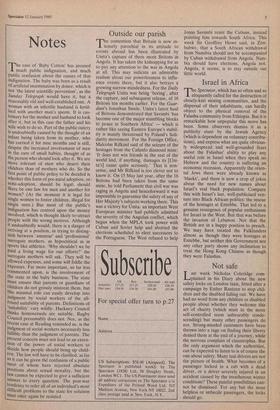Notes
Prhe case of 'Baby Cotton' has aroused
much public indignation, and much Public confusion about the causes of that indignation. The baby was born as a result of artificial insemination by donor, which is not 'the latest scientific perversion', as the Sunday Telegraph would have it, but a reasonably old and well-established one. A woman with an infertile husband is fertil- ised with another man's sperm. It is cus- tomary for the mother and husband to look after it, but in this case the father and his Wife wish to do so. Part of the public outcry is undoubtedly caused by the thought of an Infant being taken from its mother, who has carried it for nine months and is still, despite the increased involvement of men In the care of small babies, thought of as the person who should look after it. We are more tolerant of men who desert their Children than of mothers who do. So the first point of public policy to be decided is Whether this form of pre-natal adoption, or. semi-adoption, should be legal: should there be one law for men and another for Women? (At the moment it is legal for single women to foster children, illegal for single men.) But most of the public's Indignation has centred upon the money Involved, which is thought likely to-attract people with the wrong motives. Although it undoubtedly would, there is a danger of arriving at a position, in trying to disting- uish between 'amateur' and 'professional' surrogate mothers, as hypocritical as in Sports like athletics. 'Why shouldn't we be paid a living wage for our efforts?' the surrogate mothers will ask. They will be allowed expenses, and some will fiddle the expenses. Far more important, so far less Commented upon, is the involvement of the state in the baby business. The state must ensure that parents or guardians of Children do not grossly mistreat them, but this minimal role can easily develop into Judgment by social workers of the all- round suitability of parents. Definitions of suitability' vary wildly. Hackney Council thinks homosexuals are suitable, Rugby Council presumably does not. Nor, as the recent case at Reading reminded us, is the Judgment of social workers necessarily less fallible than the judgment of parents. The present concern must not lead to an exten- sion of the power of social workers to decide how people should bring up child- ren. The law will have to be clarified, as far as it can be given tt4 confusion of a public most of whom have rejected absolute Positions about sexual morality, but the law cannot be expected to give a sufficient answer to every question. The post-war tendency to refer all of an individual's most difficult problems to the state for solution must once again be resisted.






































 Previous page
Previous page